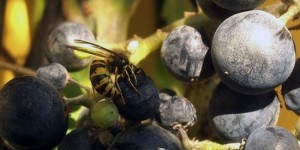La scoperta che rivoluziona il mondo del vino: le vespe fondamentali per la fermentazioneThe discovery that revolutionizes the world of wine: the wasps fundamental for fermentation
Le vespe sono l’alcova dei lieviti naturali responsabili della fermentazione del vino e garantiscono la biodiversità messa a rischio dal deterioramento ambientale e dall’utilizzo di pochi ceppi selezionati.

È la scoperta fatta da ricercatori dell’Università di Firenze e della Fondazione Edmund Mach di San Michele all’Adige, coordinati da Duccio Cavalieri. La ricerca, spiega una nota dell’Ateneo, ha documentato per la prima volta il comportamento sessuale dei lieviti in ambienti naturali, ricostruendo tappe e luoghi dell’accoppiamento dei differenti ceppi. La rivista scientifica Pnas ha indicato il lavoro fra quelli di maggiore interesse e Science l’ha già commentato nelle news and views.
“Avevamo già scoperto nel 2012 – racconta Cavalieri, associato di microbiologia generale all’Ateneo fiorentino – che le vespe portano nell’intestino i lieviti Saccharomyces cerevisiae, lasciandoli poi sugli acini d’uva maturi, dove possono iniziare naturalmente le fermentazioni vinarie”.
Per capire cosa poi succedesse ai lieviti nell’intestino delle vespe, sono stati inoculati dentro gli insetti 5 differenti ceppi di S.cerevisiae e comparato, dopo i due mesi invernali di ibernazione delle vespe, il comportamento di tali lieviti con quello di altrettante colonie cresciute in laboratorio.
“Dopo l’ibernazione, l’intestino delle vespe contiene più ibridi di ceppi parentali che genitori – spiega Cavalieri -. Abbiamo quindi dimostrato che l’intestino è il principale ambiente in cui i lieviti S.cerevisiae si accoppiano fra loro e con altri ceppi di Saccharomyces selvatici, presenti in natura, permettendo così l’evoluzione di ceppi particolarmente adatti a resistere agli stress della fermentazione di vino e birra. E’ proprio la lunga permanenza in questo ambiente confinato a favorire la generazione di gameti e l’incrocio fra gameti di individui (ceppi) della stessa specie e di specie diverse”.
“Le vespe sono messe a rischio dal degradamento ambientale – commenta Stefano Turillazzi, ordinario di zoologia e membro del team -. Ma la biodiversità di questi e altri insetti sociali, come i calabroni, ha un’importanza che va oltre il loro ruolo di impollinatori e riguarda il mantenimento di patrimoni microbici tipici importantissimi per la qualità e la tipicità dei nostri prodotti”.
Fonte: cronachedigusto.itWasps are the alcove of natural yeasts responsible for fermentation of the wine and ensure biodiversity placed at risk from environmental degradation and the use of a few selected strains.

It is the discovery made by researchers at the University of Florence and the Edmund Mach Foundation of San Michele all’Adige, led by Duccio Cavalieri. The research, explained in a statement of the University, has documented for the first time the sexual behavior of yeasts in natural environments, rebuilding stages and places of the coupling of different strains. The scientific journal PNAS has shown the work among the most interesting ones and Science has already commented on the news and views.
“We had already discovered in 2012 – says Cavalieri, associate general microbiology at the Athenaeum of Florence – that the wasps bring the intestines the yeast Saccharomyces cerevisiae, and left them on the mature grapes, where they can start the fermentations naturally”. To understand what happened then to yeast in the gut of the wasps, insects were inoculated into 5 different strains of S. cerevisiae and compared, after two months of winter hibernation of wasps, the behavior of these yeasts with the same number of colonies grown in the laboratory.
“After hibernation, the intestines of wasps contains more hybrids parental strains that parents – explains Knights -. We demonstrated that the gut is the primary environment in which the yeast S.cerevisiae are coupled with each other and with other strains of wild Saccharomyces, present in nature, thus allowing the evolution of strains particularly suited to withstand the stresses of the fermentation of wine and beer. It ‘s the long stay in this confined environment to facilitate the generation of gametes and the intersection between gametes of individuals (strains) of the same species and of different species”.
“The wasps are put at risk from environmental degradation – said Stefano Turillazzi, professor of zoology and team member -. But the biodiversity of these and other social insects, such as bumblebees, has an importance that goes beyond their role as pollinators and calls for maintaining assets typical microbial important for the quality and uniqueness of our products”.
Source: cronachedigusto.it





Leave a comment